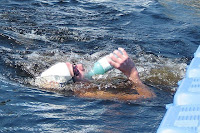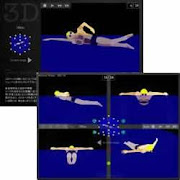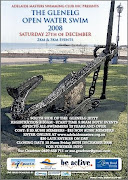 Open water swimmers hydrate before getting in the water. Then, they continue to hydrate while they are in the water, whether it is in training, during a race or in the middle of a solo swim. Like many young swimmers in a pool, Open water swimmers often feel the need to relieve themselves.
Open water swimmers hydrate before getting in the water. Then, they continue to hydrate while they are in the water, whether it is in training, during a race or in the middle of a solo swim. Like many young swimmers in a pool, Open water swimmers often feel the need to relieve themselves.  Physiologically, it is natural to feel the need to relieve ourselves in the water for a variety of reasons: a full bladder, warm water or the excitement of the challenge.
Physiologically, it is natural to feel the need to relieve ourselves in the water for a variety of reasons: a full bladder, warm water or the excitement of the challenge.We asked dozens of open water swimmers several questions about this topic that everyone knows about, but rarely discusses:
1. Have you ever felt the need to urinate while swimming in the open water?
2. If so, how often? Every time, frequently, occasionally or rarely?
3. Have you relieved yourself while swimming in the open water?
4. Is it difficult or easy for you to relieve yourself in the open water?
5. How exactly do you relieve yourself?
6. Have you ever NOT relieved yourself even though you felt a need? If so, why?
7. After your swim or race, do you feel the need to relieve yourself?
Their answers – male or female, young or older – were quite similar whether or not the individual was a marathon swimmer or a short-distance swimmer (i.e., under 5K). Not surprisingly, nearly everyone does it - or has felt the need to do it.
For most swimmers, a reduction in their kick is all it takes. Some swimmers go from a four- or six-beat kick down to a two-beat kick and urinate without any problems. Other swimmers need to stop kicking and concentrate while they let their legs drag. Others completely drop of their hips or stop altogether and go vertical to urinate. A few cannot go at all due to either cold water or the proximity of a support crew or officials of the opposite gender.
Dr. Larry Weisenthal, an avid open water swimmer, tells us that the bladder can hold up to about 500 ml of urine. Generally, humans start to want to urinate after the bladder reaches the 200-250 ml range.
Cold-water swimmer Laurin Weisenthal, who swims in the cold San Francisco Bay, raised the issue of urinating in cold water which can be difficult. "Your whole body is tightening up from the cold, so relaxing the required muscles requires effort. Plus, you are still working to swim forward and to generate heat. The effort of the initial 'starting to go' phase requires at least a slowing down of forward propulsion activities, if not outright cessation [in some cases]."
As Dr. Weisenthal explains, "Urine comes from the blood via the kidneys [so] it is nice and warm. Probably warmer than the blood of a swimmer who is fighting hypothermia. Kind of like a nice little hot water bottle, inside your body."
Marathon swimmers who have experienced the beginning stages of hypothermia have problems urinating because the bladder and kidney start to shut down in the early stages of hypothermia. The experienced open water swimmers agreed that cold water does often require a more focused approach. As one swimmer explained, "In cold water, [urination] is a lot more challenging. I slow my kick and use a combination of pushing, clenching, and relaxing my lower abdominal muscles to start urinating. Once I've started, I drag my legs and totally relax my lower body to make sure I don't "lose it" before I'm fully done. The colder the water and the longer I've been in it, the harder it is."
Conversely, many swimmers find that as their body temperature increases, the ease of being able to urinate also increases. Many have no problem whatsoever in warm-water conditions. "I adjust my leg position a little bit and pause for a brief second [and go]."
Another swimmer explains, "In shorter races, while it's nothing I plan in advance, if the situation does arise I don't hesitate and…I always receive a psychological boost from the momentary feeling of warmth in my swimsuit. It's kind of like swimming through a warm spot."
Triathletes and multi-sport athletes face other considerations. One Ironman triathlete explains, "…at the Ironman, I hydrated so well that I actually had to 'go' twice within 2.4 miles and I knew that it would be easier and neater to take care of it while I was still in the water rather than waiting to do so on the bike (which also occurred anyway). Each time I did, I imagined that my bladder, now empty, had gone from neutral buoyancy while full of fluid to positive buoyancy when empty. I imagined myself gaining a bit of the triathlon wetsuit speed effect and, both times, I tossed-in a small surge that propelled me past several other swimmers in the field. As you can see, psychology (i.e. self-deception) is a consideration."
Swimming with a full bladder can be uncomfortable and take away from your enjoyment or speed, especially as your swim increases in length. One veteran swimmer frankly explained the general consensus of the community, "Not peeing when you need to is painful. My stomach hurts, I definitely can't eat or drink anything more, which is really bad when you're doing a long swim...and it's distracting."
Of course, as Dr. Jim Miller, the USA Swimming national open water swimming team physician, says, "No need to practice these techniques during pool workouts."
But, go if you must [in the open water]. And, go if you can.
Copyright © 2009 by World Open Water Swimming Association




















No comments:
Post a Comment